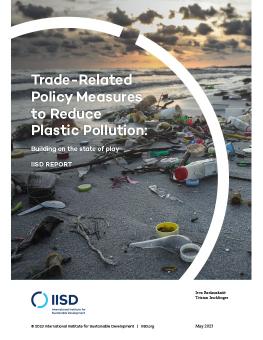
Trade-Related Policy Measures to Reduce Plastic Pollution: Building on the state of play
As international efforts to tackle plastic pollution are underway at both the United Nations and the WTO, this report examines the trade-related plastic pollution-reduction measures that have already been taken and notified by members of the WTO. By providing a detailed overview of existing policy interventions, the report aims to contribute to ongoing discussions on what further steps could be taken by governments in their efforts to address this complex environmental challenge, either individually or collectively.
With the ubiquitous use of plastics in modern societies, plastic pollution has become one of the defining environmental challenges of our time. Governments across the world have already recognized this, undertaking a variety of measures to curb the reliance on the plastics and plastic products that they consider to be the most harmful, or the least necessary, and setting in motion international cooperation processes at both the UN and the WTO to find collective solutions.
As these international discussions proceed, this report aims to shed light on the trade-related measures that have already been taken and notified by WTO members in their efforts to reduce plastic pollution. It provides a detailed examination of these existing measures and offers suggestions on how governments across the world could build on them as they consider their next individual or collective steps in addressing the plastics crisis.
The report starts by providing a general overview of the trade-related plastic pollution-reduction measures notified by WTO members, including their distribution by region, development status, types of targeted products, as well as types of policy measures. The report then dives into more detail on the most common approaches taken by members, with a particular focus on bans. It zooms in on a number of concrete examples, illustrating the variety of ways in which members have chosen to establish such prohibitions, in particular regarding the plastic products that are targeted and how such prohibitions are constructed. Some of the less frequently notified kinds of measures are also highlighted.
Based on this mapping, the report then concludes by highlighting three broad objectives that policy-makers should pursue as they contemplate and design their next steps in the fight against plastic pollution:
- Enhanced transparency and experience sharing: making existing efforts to reduce plastic pollution more visible to other governments and generating more learning opportunities.
- Geographic expansion and best practices: exploring whether well-established types of measures could be applied in places where they do not exist today and whether best practices can be derived from existing experiences in applying them.
- Thematic scope expansion: exploring whether new areas of policy intervention can be identified to deliver meaningful results in tackling plastic pollution, in particular by targeting parts of the plastics economy that are currently not (or rarely) targeted, but deserve to be.
You might also be interested in
What Is the UAE Framework for Global Climate Resilience, and How Can Countries Move It Forward?
With the introduction of the new framework for the Global Goal on Adaptation (GGA), COP 28 marked a milestone for adaptation. We unpack key outputs and set out how countries can move forward by strengthening their national monitoring, evaluation, and learning (MEL) systems.
Urgent Action Is Needed to Better Reward Tea Farmers for Using Sustainable Practices
There are 13 million people propping up the global tea industry. Two thirds of those people are smallholder farmers in developing countries, many of whom live in poverty. New research from the International Institute for Sustainable Development unearths the latest consumption and production trends in the sector and explores why so many tea farmers are struggling to make a living.
Global Market Report: Tea prices and sustainability
This report explores recent market trends in the tea sector and explains why we need to get better at recognizing the social and environmental costs of tea production.
'Car without wheels': Adaptation playbook lacks finance target
Governments at the COP 28 climate talks in Dubai have agreed on a playbook for adapting to climate change in areas like health, protecting nature and food and water security. But while wealthy countries celebrated the agreement, developing and particularly African countries denounced the absence of a target to provide financial and other forms of support.